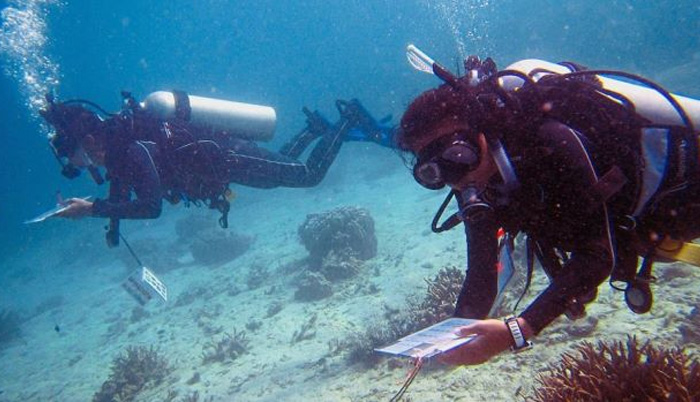![]() Home > Malaysia
Home > Malaysia
Hardy Tioman Reefs Showing Resilience

Colourful landscape: Scuba divers surveying the coral reefs at the Tioman island archipelago. The island still has at least 58 live coral cover (inset).
![]() April 10th, 2017 | 08:45 AM |
April 10th, 2017 | 08:45 AM | ![]() 1516 views
1516 views
TIOMAN
Coral reefs at the Tioman island archipelago are showing incredible resilience in the face of warming seas and other threats, a survey by scuba divers found.
Tioman still displayed a total average of 58% live coral cover, with 50% of them hard corals and the rest, soft corals.
This was revealed in this month’s report from Biosphere Expeditions called “Paradise in Peril: Studying & Protecting Reefs within the Tioman Archipelago Marine Protected Area”.
The report, written by Alvin Chelliah of Reef Check Malaysia and Matthias Hammer, editor at Biosphere, was based on a survey by scuba divers in August last year.
Also called reef-building corals, hard corals produce a rock-like skeleton made of the same material as chalk (calcium carbonate), while soft corals produce smaller amounts of calcium carbonate (hence, not as “hard”).
“This is higher than the national average of 46% recorded in 2015 and an improvement on the 52% recorded during the last Biosphere Expeditions survey in 2013.
“Furthermore, coral reefs around Tioman also appeared to be resilient to the 2015-16 global bleaching event, with only 4% of the population showing signs of bleaching”, the report said.
The surveys were part of a continuous study that began in 2012.
“Corals which did bleach also showed positive signs of recovery as only 13% of the surface area of colonies were still bleached by August last year and less than 1% of recently killed coral was recorded,” said the authors.
Coral bleaching refers to the loss of symbiotic algae which contributes nearly 90% of energy to sustain the coral. These algae live on the coral. The loss of such algae may be triggered by warming seas, among other factors.
Corals that no longer enjoy the support of symbiotic algae will slowly starve, lose their colour pigmentation and die.
While coral bleaching at Tioman does not look too severe, the bad news is that other forms of marine life typically collected for food and the aquarium trade “continue to be either absent, or were recorded in very low numbers throughout all survey sites”, said the report, which also recorded signs of substantial untreated wastewater discharged from land.
“Along with high nutrient content in the water, illegal harvesting of marine life along with increased development on land continue to be the main threats to reefs around Tioman,” said Alvin and Hammer, adding that the “no fishing” ruling there needs to be strictly enforced.
The Tioman archipelago was gazetted as a marine park in 1994. It comes under the Pahang Marine Parks Department.
The report called for better coastal development planning, reduction of tourism impacts, as well as better waste and wastewater management systems to ensure the sustainability of the Tioman reefs, which sits within the Coral Triangle – a reef network spanning Indonesia, the Philippines, Malaysia, Papua New Guinea, the Solomon Islands and Timor-Leste.
This triangle supports the world’s highest diversity of coral species, with over 600 types of reef-building corals, more than 3,000 species of fish, and 75% of all known coral species.
More information is available at reefcheck.org.my and biosphere-expeditions.org.
Organised jointly by Reef Check Malaysia and Biosphere Expeditions, the week-long survey in August last year was aimed at collecting data so that the authorities can make informed decisions on the management of the marine park located 40km off the east coast of Peninsular Malaysia.
Source:
courtesy of THE STAR
by MENG YEW CHOONG
If you have any stories or news that you would like to share with the global online community, please feel free to share it with us by contacting us directly at [email protected]